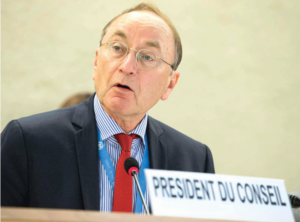The United Nations Human Rights Council has tasked the Office of the High Commissioner for Human Rights to convene two expert consultations, to discuss the relationship between human rights and technical standard-setting processes for new and emerging digital technologies
It recognized that new and emerging digital technologies can have the potential to facilitate efforts to accelerate human progress, to promote and protect human rights and fundamental freedoms, to bridge digital divides, to support the enjoyment of the rights of persons with disabilities and those in vulnerable situations, the advancement of gender equality and the empowerment of all women and girls, and to ensure that no one is left behind in the achievement of the Sustainable Development Goals.
The consultations will also look into the practical application of the Guiding Principles on Business and Human Rights to the activities of technology companies, and submit a report thereon, reflecting the discussions held in an inclusive and comprehensive manner, to the Human Rights Council at its fiftieth and fifty-third session.
Among other things, the Council also established an Independent Mechanism on Systemic Racism in Law Enforcement, extended two Country-Specific Mandates, adopted Universal Periodic Review Outcomes for 13 States, and appointed 7 Mandate Holders.
It was a hectic time as the Council concluded its forty-seventh regular session after adopting 25 resolutions and 2 decisions, creating an independent expert mechanism on systemic racism in law enforcement and extending mandates on Eritrea and Belarus.
The Council also encouraged continued discussions on the possible creation of a new special procedure on climate change and human rights.
Specifically, on its resolution (A/HRC/47/L.12/Rev.1) on New and emerging digital technologies and human rights, the Council took due consideration of all relevant international human rights instruments, and resolution 41/11 of 11 July 2019 on new and emerging digital technologies and human rights, as well as took cognizance of the Secretary-General’s initiatives on new technologies, including the Call to Action for Human Rights, launched in 2020, the Road Map for Digital Cooperation, launched in June 2020, and the establishment of the Office of the Envoy of the Secretary- General on Technology.
It recalled the guiding Principles on Business and Human Rights, as endorsed by the Human Rights Council in its resolution 17/4 of 16 June 2011, and encouraging States, who are the primary duty-bearers, and business enterprises, including technology companies, to implement the Guiding Principles in order to foster respect for human rights online and offline in the context of new and emerging digital technologies and human rights due diligence processes.
The Human Rights Council reiterated the importance of ensuring appropriate safeguards and human oversight in the application of new and emerging digital technologies, and of respecting and promoting human rights in national, regional and international regulatory frameworks and legislation and on the conception, design, use, development, further deployment and impact assessments of new and emerging digital technologies, while ensuring the meaningful participation of all relevant stakeholders, including the private sector, academia and civil society.
It harped on the risks that new and emerging digital technologies may have for the protection, promotion and enjoyment of human rights, including but not limited to the right to equality and non-discrimination, the right to freedom of opinion and expression, the rights to freedom of peaceful assembly and freedom of association, the right to an effective remedy and the right to privacy, in accordance with States’ obligations under international human rights law.
The Council tasked the Office of the United Nations High Commissioner for Human Rights to develop system-wide guidance on human rights due diligence and impact assessments in the use of new technologies.







